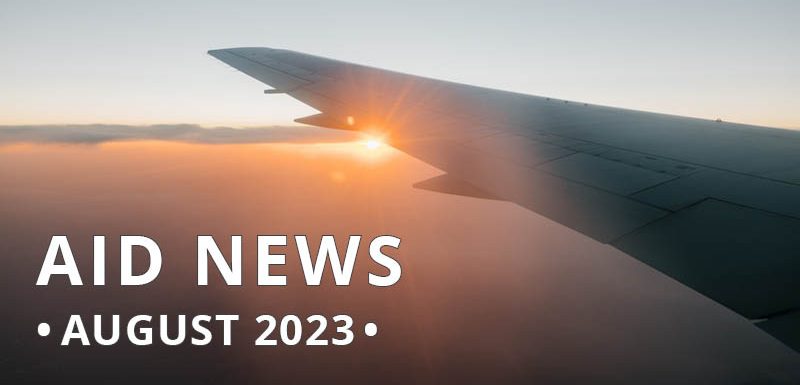Our monthly update of news and analysis on aid and international development, with a focus on Australian aid.
Australian aid
The Albanese government has released its new international development policy, as well as a supporting performance and delivery framework and a review of development finance. You can find ongoing analysis on the Devpolicy Blog. Commentary on the policy has also been produced by the Australian Council for International Development, the Development Intelligence Lab, and the Lowy Institute.
The Opposition has welcomed the new policy, including new commitments on aid transparency, stating that “It is important that Australians know where their money is being spent and that desired outcomes are being achieved.”
The ALP has again demurred on a date for reaching Labor’s longstanding pledge to increase aid to 0.5% of Gross National Income. Instead, the party’s 2023 national platform reportedly promises a “plan and a pathway” for reaching the target. The ratio is currently 0.2% and is projected to fall to 0.14% by 2036-37.
In responses to Questions on Notice (no. 135) from Senate Estimates, DFAT has confirmed that despite dwindling donor funding and persistent needs, its support for Rohingya refugees in Bangladesh delivered through the Australian Humanitarian Partnership has been cut – from $42 million for the period January 2020 to September 2023 (3.75 years) to $16 million for the period July 2023 to December 2025 (2.5 years).
In more positive news, the government has announced that it will lift Australia’s annual humanitarian intake to 20,000 places from its current cap of 17,875. This will restore the cap to where it was in 2013, when Labor was last in power.
The Minister for International Development and the Pacific, Pat Conroy, has said that Australia will use multilateral development bank shareholder meetings to push for reform of the banks’ procurement processes, which he says favour low-cost bidders in the Pacific that are, in some cases, “downing tools halfway through a project and saying we won’t finish this unless you give us an increased contract” and “bringing workforces – that’s causing social problems”.
DFAT is seeking submissions on the government’s new international gender equality strategy, and the Department of Health and Aged Care has released a consultation paper and is seeking submissions on Australia’s efforts to prepare for, and respond to, future pandemics and other international health emergencies.
Regional/global aid
During her visit to PNG and Fiji, USAID Administrator Samantha Power opened new USAID representative offices in Port Moresby and Suva. Speaking at the University of the South Pacific, Power declared, “we give grants, we don’t give loans, because what we really want to see is the independence, the economic independence of communities as well as nations … this is a really different model, one that emphasises human rights, transparency, inclusion, environmental safeguards, and economic independence”.
Pacific Islands Forum Economic Ministers have signed off on a redesign of the Pacific Resilience Facility, a regional financing mechanism aimed at improving access to climate change support for its developing country member states. Australia and the US have provided technical assistance to the Facility and the final design will be considered by Forum leaders later in the year.
The head of the Caribbean Development Bank, Hyginus Leon, has expressed his concern that middle-income small island developing countries will be excluded from a new loss and damage fund if eligibility is assessed only on the basis of per capita income rather than vulnerability.
At the BRICS (Brazil, Russia, India, China, South Africa) summit in Johannesburg, leaders agreed to bring six new members into the loose economic and development finance grouping: Saudi Arabia, United Arab Emirates, Iran, Egypt, Ethiopia and Argentina. Indonesia, which some expected to be invited to join, said it is still considering BRICS membership.
USAID has released a new LGBTQI+ Inclusive Development Policy and the World Bank has released a consultation draft of its new gender equality strategy.
The World Bank has frozen new loans to Uganda in response to the country’s draconian anti-LGBTQI+ laws.
Key US Congressional Republicans are delaying reauthorisation of the President’s Emergency Plan for AIDS Relief (PEPFAR) over concerns that the program is being used to indirectly support abortions – “claims that health advocates, Democrats and PEPFAR officials say are baseless”.
The Foreign, Commonwealth and Development Office’s own assessment of the impact of UK aid cuts concedes that more women will face unsafe abortions and that thousands will die in pregnancy and childbirth as a result of the cuts.
Books, papers, reports, podcasts etc.
A new review of Australians’ support for foreign aid published in the Australian Journal of International Affairs concludes that “elite appeals to the national interest are not strongly reflected in public preferences, and future studies could focus on whether interventions from the aid sector or representatives from developing nations might be more efficacious in shifting views”.
As part of World Humanitarian Day (19 August), the New Humanitarian has published a series of articles profiling “local aid workers who bear the brunt of the risk in conflict and disaster zones, and … the affected communities themselves”.
The Development Initiatives platform has published a stocktake of the issues associated with accounting for climate aid ahead of the November COP27 meetings in the UAE.
Publish What You Fund has released the list of agencies and organisations that will be included in its 2024 Aid Transparency Index.
Disclosure
Material for this update has been collected by Devpol staff; editorial responsibility lies with Cameron Hill. Devpol’s work on Australian aid is supported by the Bill & Melinda Gates Foundation. The views represent those of Centre staff only.


Leave a Comment